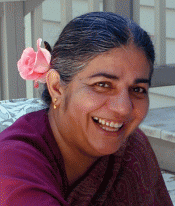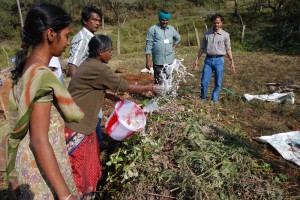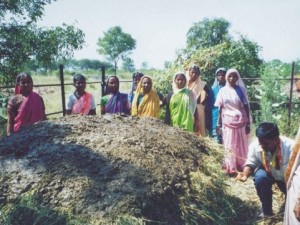Waldorf News
Earth’s Dignity: A Plea

Today, there are one billion people who go hungry and half of them produce food.
Something is going dreadfully wrong when even farmers and gardeners have to go hungry. This fact did not arise overnight, but happened in two steps. First came industrialization of agriculture, the “Green Revolution,” which is neither green nor revolutionary. Bill Gates and his financially strong foundation are a leading force in AGRA (Alliance for a Green Revolution in Africa). They see agriculture as a war and the weapons are pesticides and fertilizers benefiting the chemical industry; however, it is actually a war against the people. Instead of biodiversity we have monoculture. Our small holdings have been reduced, forestry and animal husbandry were banished. Fertility has decreased. What has been advertised as a step against world hunger was a path to hunger.
Next, local seeds were patented and prices increased so that farmers became poorer. In India, the so-called BT-cotton was introduced. However, this highly cultivated American cotton also brought the cotton bollworm to India. As a result, thirteen times as much pesticides were required. The consequences in India have been so drastic that since 1979 an unbelievable 25,000 suicides, mainly amongst farmers, have been recorded. We can prove that 85% of these suicides are linked to the social and economic costs of BT-cotton. In India we say a prayer during sowing: “May the seed be inexhaustible,” referring to the seed as the seed of life. From agricultural businesses like Monsanto, I hear: “May the seed be exhaustible so that profits are inexhaustible.”
Therefore we are working together in a big coalition of movements in order to safeguard the diversity of seeds. Maintaining diversity is the basis of life. There are many who believe food is just a commodity. But food as a commodity does not fit into the circle of life. When food becomes a commodity it becomes worthwhile to use 70% of US cereal as animal fodder, and speculation increases the price of bread. When we begin to see food as sacred, then we re-discover how sacred our earth is. Those who concern themselves with the earth, the farmers, are doing this service. It is about the sacredness of life.
 This year is not only Rudolf Steiner‘s 150th anniversary but it is also the 150th anniversary of our national poet Tagore. He wrote a wonderful poem to Mother Earth. It says: “I will pour my songs into your mute heart, and my love into your love. I will worship you with labor. I have seen your tender face and I love your mournful dust, Mother Earth.” This sentence: “I will worship you with love” is important. Otto Scharmer has already emphasized: Everything starts with nature. It gives us everything, but what do we give in return? Only our beloved effort. And this sacred work has been declared a curse. Productive agriculture today means to be able to do without human labor. American agriculture thus is the most productive because fewer people live on the land than in prisons.
This year is not only Rudolf Steiner‘s 150th anniversary but it is also the 150th anniversary of our national poet Tagore. He wrote a wonderful poem to Mother Earth. It says: “I will pour my songs into your mute heart, and my love into your love. I will worship you with labor. I have seen your tender face and I love your mournful dust, Mother Earth.” This sentence: “I will worship you with love” is important. Otto Scharmer has already emphasized: Everything starts with nature. It gives us everything, but what do we give in return? Only our beloved effort. And this sacred work has been declared a curse. Productive agriculture today means to be able to do without human labor. American agriculture thus is the most productive because fewer people live on the land than in prisons.
But why this attack on small holders everywhere in the world? It is the last refuge of freedom!
Recently I interviewed organic farmers in the Indian mountains. An old woman was asked why she farmed in this terrible place. Her reply was: “It is the only way of being completely free.” Every human being needs food, therefore agriculture counts as a primary economy which gains its vitality from the diversity and initiative of the whole of society. Besides the biological dangers from genetically-modified plants there are also legal dangers. Patented genomes are not there for breeding reasons but to gamble on Wall Street. The aim is that for every grain that we want to plant we pay the apparent owners. It is an attack on two fronts: They destroy independent seed supply through over-regulation and force us to buy the patented seeds. North Africa is freeing itself of dictatorships and here we are establishing an economic dictatorship which wants to get hold of the planet‘s resources. It is the next step in dominance over the earth after owning the land. This too speaks of a terrifying dynamic. Rich states and businesses buy land in Africa. They say that 76% of the earth‘s biomass is still unused. A woman collecting firewood in order to cook a meal, camels grazing on pasture—all this is viewed as wasted biomass. As if they were saying: A river‘s water flowing into the sea is a waste of water.
 We are looking towards the future and we know that the biological and cultural diversity, and decentralized structures are the basis for a healthy and fruitful development. Here we do not fear comparisons. Fourteen quintals of rice can be produced by a biodynamically-managed hectare of land, whilst land farmed with chemical fertilizer and monoculture only gives 12 quintals.* They say that the chemically-produced rice is more productive because the financial profit is higher. Then we have to look at protein, carbohydrates and fat—338 units for 90 with the chemical system. Folic acid, which is needed by pregnant women, 554 to 0, or calcium 3420 to 100. We have made a rough calculation. If we were to realize this expanded ecological system that respects life and national cultures in all Arab countries, we would have enough food for 2.5 billion people, more than double the population of India.
We are looking towards the future and we know that the biological and cultural diversity, and decentralized structures are the basis for a healthy and fruitful development. Here we do not fear comparisons. Fourteen quintals of rice can be produced by a biodynamically-managed hectare of land, whilst land farmed with chemical fertilizer and monoculture only gives 12 quintals.* They say that the chemically-produced rice is more productive because the financial profit is higher. Then we have to look at protein, carbohydrates and fat—338 units for 90 with the chemical system. Folic acid, which is needed by pregnant women, 554 to 0, or calcium 3420 to 100. We have made a rough calculation. If we were to realize this expanded ecological system that respects life and national cultures in all Arab countries, we would have enough food for 2.5 billion people, more than double the population of India.
You have probably heard of the genetically-modified golden rice which prevents blindness because it contains beta carotin. We have discovered that our local rice contains more of it. Neither do we need genetically-modified rice for vitamin A. Ecological cultivation in India can produce sufficient vitamin A for 1.5 billion people and folic acid for 1.7 billion pregnant women. There is no reason for children to starve. And yet in India, one million children annually starve due to malnourishment. Why? Because food is no longer grown—commodities are grown. And the diversity of human food has shrunk from 8500 plants to mainly eight worldwide traded commodities.
 In my book Soil Not Oil I discuss how 40% of the climate problem has been caused by industrial agriculture and food production, and thus could be solved by biodynamic cultivation. The objection usually raised is emission trading. This has increased the emissions by 16% and made the perpetrators richer and richer. We are faced with a world where everything is a commodity and life is being privatized and industrialized with the result that the work of small holders is criminalized. President Evo Morales of Bolivia had the courage to demand a general declaration of rights for Mother Earth. In our time we have to recognize that without securing rights for Mother Earth, there will be no human rights. The moment we accept this, a sacred band is woven between man and earth. A band which is found in the spiritual cosmologies of many cultures. We are entering exciting times if we are able to do away with the old divisions between North and South, between producer and consumer, between farmer and scientist on the path to a different consciousness. The earth is the reason for a new civilization. From the small country of Bhutan I received an invitation to switch their agriculture 100% to biodynamic. The government had discovered that growth also has to include personal happiness.
In my book Soil Not Oil I discuss how 40% of the climate problem has been caused by industrial agriculture and food production, and thus could be solved by biodynamic cultivation. The objection usually raised is emission trading. This has increased the emissions by 16% and made the perpetrators richer and richer. We are faced with a world where everything is a commodity and life is being privatized and industrialized with the result that the work of small holders is criminalized. President Evo Morales of Bolivia had the courage to demand a general declaration of rights for Mother Earth. In our time we have to recognize that without securing rights for Mother Earth, there will be no human rights. The moment we accept this, a sacred band is woven between man and earth. A band which is found in the spiritual cosmologies of many cultures. We are entering exciting times if we are able to do away with the old divisions between North and South, between producer and consumer, between farmer and scientist on the path to a different consciousness. The earth is the reason for a new civilization. From the small country of Bhutan I received an invitation to switch their agriculture 100% to biodynamic. The government had discovered that growth also has to include personal happiness.
I want to close with the wish to create much more community and interaction between centers like the Goetheanum, all farms where you are working and all areas where human freedom is seen as a value. The most important thing we have learned from Gandhi is the expression “Satyagraha.” This means the force of the soul for truth. When we look towards the future we have to keep an eye on the wonderful majesty of the earth. The freedom to decide what we eat and what not to eat lies in our hands. Wendell Berry expressed it fantastically: Eating is an agricultural act. What we consume is what we support. They are small actions which, when multiplied over the whole earth, will start a food revolution. Let’s do it together!
“Earth’s Dignity” is a talk presented by Dr. Shiva at the “Future of Agriculture” conference at the Goetheanum in Dornach, Switzerland in 2011.
Dr. Vandana Shiva is a physicist, ecologist, activist, editor, and author of many books. In India she has established Navdanya, a movement for biodiversity conservation and farmers’ rights. She directs the Research Foundation for Science, Technology and Ecology and is on the board for the International Forum on Globalization.
*One quintal equals 100 kilograms.

 Space speaks. Its language is movement.
Space speaks. Its language is movement. Bringing Love to Learning for a Lifetime
Bringing Love to Learning for a Lifetime Transforming Voices Worldwide
Transforming Voices Worldwide Quality Education in the Heartland
Quality Education in the Heartland The Journey is Everything
The Journey is Everything ~ Ensoul Your World With Color ~
~ Ensoul Your World With Color ~ Waldorf-inspired Homeschool Curriculum
Waldorf-inspired Homeschool Curriculum Everything a Teacher Needs
Everything a Teacher Needs Immersive Academics and Arts
Immersive Academics and Arts Bay Area Teacher Training
Bay Area Teacher Training Full-Time Teacher Education
Full-Time Teacher Education Summer Programs - Culminating Class Trips
Summer Programs - Culminating Class Trips Great books for Waldorf Teachers & Families
Great books for Waldorf Teachers & Families Waldorf Training in Australia
Waldorf Training in Australia Association for a Healing Education
Association for a Healing Education Jamie York Books, Resources, Workshops
Jamie York Books, Resources, Workshops Train to Teach in Seattle
Train to Teach in Seattle Caring for All Stages of Life
Caring for All Stages of Life Apply Today: New Cohort Starts Nov. 2025
Apply Today: New Cohort Starts Nov. 2025 Middle School Science With Roberto Trostli
Middle School Science With Roberto Trostli Roadmap to Literacy Books & Courses
Roadmap to Literacy Books & Courses Flexible preparation for your new grade
Flexible preparation for your new grade RSS Feeds
RSS Feeds